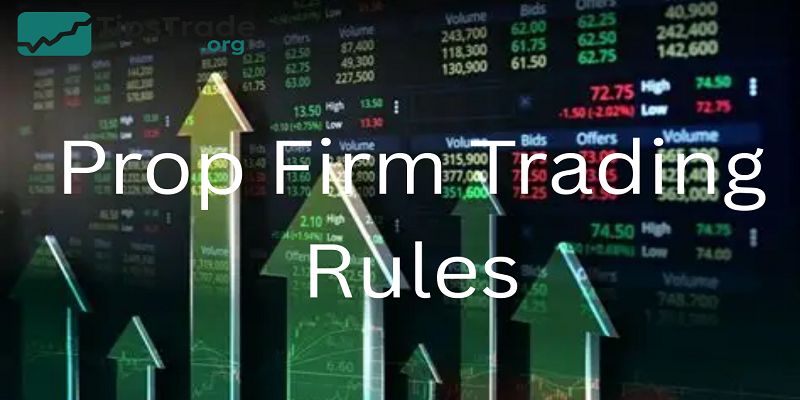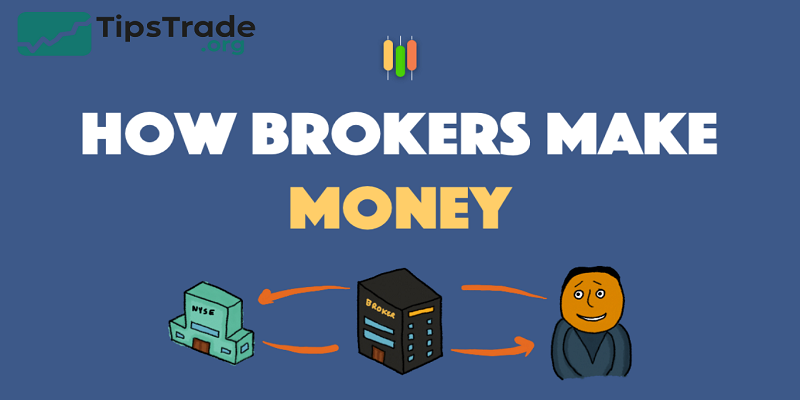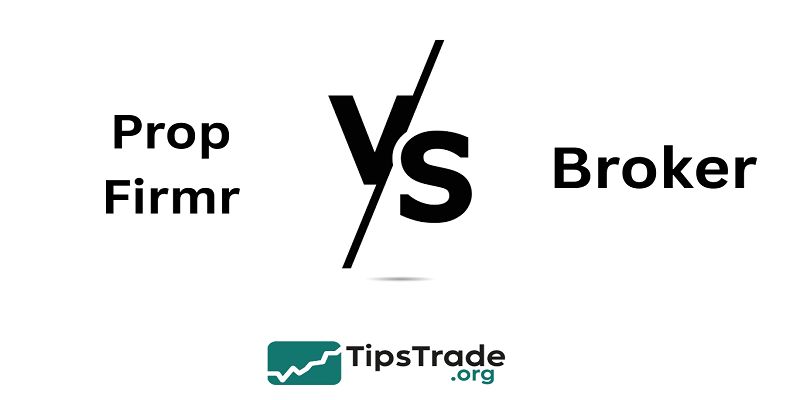Prop Firm vs Broker is an important topic for traders choosing how to access capital and trade. Prop firms provide traders with company funds and support, reducing personal risk, while brokers require traders to use their own money with full control and risk. Through this article, let’s explore the detailed differences and help you decide the best trading path at https://tipstrade.org/wp-admin/.
What is a Prop Firm?

A Proprietary Trading Firm (Prop Firm) is a company that allocates its own capital to traders. Instead of depositing personal funds, traders pay a one-time fee to take an evaluation or “challenge.” If they pass by meeting profit targets and following strict risk rules, they are awarded a funded account.
Key Features of Prop Firms:
- Evaluation Phase: Traders must reach profit goals (e.g., +10%) without breaching drawdown limits.
- Funded Capital: Accounts can range from $10,000 to $500,000 depending on the firm.
- Profit Split: Most firms share 70–90% of profits with the trader.
Strict Rules: Daily loss limits, max drawdown, no news trading, no arbitrage, etc.
Examples of Popular Prop Firms:
- FTMO – One of the pioneers, trusted globally.
- MyForexFunds (MFF) – Fast growth, though faced regulatory issues.
- The 5%ers – Focuses on long-term scaling.
- FundedNext, The Funded Trader, Apex Trader Funding – Known for flexible programs.
In short: Prop Firms allow skilled traders to access big capital with limited personal risk — but passing their tests is not easy.
How Prop Firm Funding Works

Most Prop Firms operate on a challenge model. Traders pay an upfront fee (e.g., $250 for a $50,000 account) to take a test. The process usually includes:
- Challenge / Evaluation Phase
- Reach a profit target (e.g., +10%) within a time limit.
- Stay under strict drawdown rules.
- Verification Phase
- A lighter second test with smaller profit targets.
- Funded Account
- Once passed, the trader receives real or simulated capital.
- Profits are split — usually 80–90% to trader, 10–20% to firm.
Example:
- Trader pays $300 for a $100k challenge.
- Passes both stages and gets funded.
- Makes $10,000 profit → keeps $8,500 (at 85% split).
This model attracts ambitious traders who lack large personal capital but are confident in their skills.
Prop Firm Trading Rules

Prop Firms are strict because they risk their capital. Common rules include:
- Daily Drawdown Limit – e.g., max 5% of account per day.
- Max Total Drawdown – often 10–12% of funded balance.
- Lot Size Restrictions – prevent over-leveraging.
- No High-Risk Strategies – such as martingale, arbitrage, or certain news scalps.
- Time Limits – some firms require targets to be hit within 30 days.
While these rules encourage discipline, they can also frustrate traders who rely on flexible or aggressive strategies. Beginners often struggle with these restrictions, making brokers a safer starting point.
What is a Broker?

A Broker is a financial intermediary that provides access to the Forex and CFD markets. Unlike prop firms, brokers require traders to use their own funds. Brokers earn from spreads, commissions, and swaps, not from profit-sharing.
Types of Brokers:
- Market Maker (Dealing Desk) – Sets prices and may trade against clients.
- ECN / STP (No Dealing Desk) – Connects traders directly to liquidity providers.
Broker Roles:
- Provides trading platforms like MT4, MT5, or cTrader.
- Offers leverage (up to 1:500 in some regions).
- Facilitates deposits and withdrawals.
- Manages regulatory compliance under licenses (FCA, ASIC, CySEC, etc.).
For beginners, brokers are the most accessible entry point. You can start with as little as $10–$100, open a demo account, and learn trading basics without strict external rules.
How Brokers Make Money

Unlike prop firms, brokers do not profit-share. Instead, they charge fees:
- Spread – The difference between bid and ask price.
- Commission – Fixed fee per lot traded (common in ECN accounts).
- Swap / Overnight Fee – Charged for holding positions overnight.
Example:
- A EUR/USD trade with 1.0 lot → spread = 1 pip ($10).
- Commission = $7 round trip.
- Swap depends on interest rate differences.
While fees can add up, brokers are transparent, and skilled traders can optimize costs by choosing low-spread accounts.
Broker Accounts & Leverage

Most brokers offer multiple account types:
- Standard Account – Wider spreads, no commission.
- ECN/RAW Account – Tight spreads + commission.
- Cent/Micro Account – For beginners, with very small trade sizes.
- VIP Accounts – For large deposits with premium support.
Leverage in Brokers
- Leverage magnifies both profits and losses.
- Regulated brokers in Europe/UK limit leverage to 1:30.
- Offshore brokers may offer up to 1:1000.
For new traders, leverage should be used cautiously. Starting with a micro or cent account helps build discipline without risking too much capital.
Prop Firm vs Broker: Key Comparisons
Here’s a breakdown of the major differences:
| Aspect | Prop Firm | Broker |
| Capital | Provided by firm (after challenge) | Trader’s own money |
| Profit Split | 70–90% to trader | 100% trader keeps |
| Risk | Limited to challenge fee | Trader risks entire deposit |
| Rules | Strict drawdown & strategy limits | Flexible, few restrictions |
| Start Cost | $100–$500 (challenge fee) | Any deposit ($10–$10,000+) |
| Best For | Skilled traders with little capital | Beginners learning with small funds |
This comparison shows why prop firms are attractive for scaling, but brokers remain the best starting point for new traders.
Advantages of Prop Firms
Pros:
- No need for large personal capital.
- Access to accounts as high as $500,000.
- High profit share (up to 90%).
- Encourages discipline and risk management.
- Some firms offer scaling programs (grow from $100k → $1M).
Cons:
- Strict rules and pressure to perform.
- Risk of losing challenge fee without payout.
- Not beginner-friendly.
- Some firms are unregulated or short-lived.
Advantages of Brokers
Pros:
- Full control of your trading account.
- Keep 100% of profits.
- No external trading rules.
- Low entry cost (even $10).
- Ability to practice on demo or micro accounts.
Cons:
- Personal capital is fully at risk.
- Larger accounts require significant funding.
- Scam brokers exist — need regulation checks.
- Higher emotional pressure trading personal money.
When to Choose Prop Firm vs Broker
- Beginner Traders → Start with a Broker. Use demo or micro accounts to practice risk management and strategy.
- Intermediate / Experienced Traders → Consider a Prop Firm once you’re consistently profitable. Use their capital to scale without risking your own savings.
- Professional Traders → Many combine both: small broker accounts for strategy testing + funded prop accounts for large-scale trading.
How to Choose a Reliable Prop Firm
Key criteria:
- Reputation & years in business (e.g., FTMO founded 2015).
- Transparent rules (clear drawdown policies).
- High profit split (80–90%).
- Reliable payouts, fast withdrawals.
- Community feedback (Trustpilot, MyFXBook reviews).
Top Prop Firms (2025):
- FTMO
- The 5%ers
- Apex Trader Funding
- FundedNext
- The Funded Trader
How to Choose a Trusted Broker
Check for:
- Regulation: FCA (UK), CySEC (EU), ASIC (Australia).
- Trading platforms: MT4/MT5, cTrader.
- Transparent spreads & commissions.
- Reliable deposit/withdrawal methods.
- Vietnamese support (for local traders).
Top Brokers (Global & Vietnam):
- IC Markets
- Exness
- XM
- IG
- OANDA
Tip: Always verify licenses on official regulator websites. Avoid brokers with only offshore registrations.
Prop Firms vs Brokers – Future Outlook
- Prop firms have been booming from 2021 to 2025, driven mainly by retail trader demand and social media platforms like YouTube, which popularize prop trading as an accessible path to trade with firm capital.
- These firms typically offer traders the chance to trade using the firm’s money after passing evaluations, sharing profits while limiting the trader’s personal financial risk primarily to the evaluation fee.
- Prop firms attract skilled traders by eliminating the need for significant upfront capital and imposing strict risk management rules, positioning themselves as appealing alternatives to traditional retail trading accounts at brokers.
- Brokers, meanwhile, remain essential as they provide the critical infrastructure for market access, regulation, and safeguarding client funds. CFD brokers require clients to use their own capital, bearing the full risk and offering full profit retention after fees.
- Brokers also operate under stronger regulatory regimes, especially in regions like the EU and UK, to protect traders and maintain market integrity.
- This regulatory oversight helps maintain stability in the trading ecosystem, contrasting with the often lighter regulation faced by prop firms since the latter do not hold client deposits directly.
- Hybrid models are emerging, where brokers partner with prop firms to offer challenge or evaluation accounts directly on their platforms.
- This convergence allows traders to benefit from the best of both worlds—broker infrastructure and regulatory protection combined with prop firm funding models.
- Such integrations are increasingly common as the industry evolves to better serve retail traders’ needs.
- Regulatory trends suggest that authorities may impose stricter oversight on prop firms to enhance trader protection.
- The currently lighter regulation on prop firms is likely to face tightening as regulators seek to close gaps in coverage, ensure transparency, and mitigate risks associated with profit-sharing and evaluation-based funding models.
- This trend aims to safeguard retail traders who participate in these models and foster long-term sustainability in the prop trading sector.
In summary:
| Aspect | Prop Firms | Brokers | Hybrid Models | Regulation Trends |
|---|---|---|---|---|
| Business Model | Fund traders with firm’s capital, profit share | Clients trade own capital, full profit retained after fees | Broker platforms offering prop challenges | Stricter oversight expected on prop firms |
| Trader Risk | Limited personal risk (evaluation fees) | Trader bears full financial risk | Combination of broker and prop firm risk models | Increased transparency and protections |
| Capital Requirement | Evaluation fee often required | Full account funding required | Varies, depends on partnership | Regulatory scrutiny to tighten |
| Trader Attraction | Appeals to skilled traders without big capital | Appeals broadly with regulated access | Hybrid appeal to diverse trader needs | Focus on trader protection |
Conclusion
Prop Firm vs Broker: Prop firms provide traders with company capital, limiting personal risk and offering structured support, while brokers require traders to use their own funds, giving full control but with higher risk. For most traders, especially beginners or those with limited capital, prop firms offer a safer, faster path to professional trading, whereas brokers suit experienced traders wanting full autonomy and profit retention

